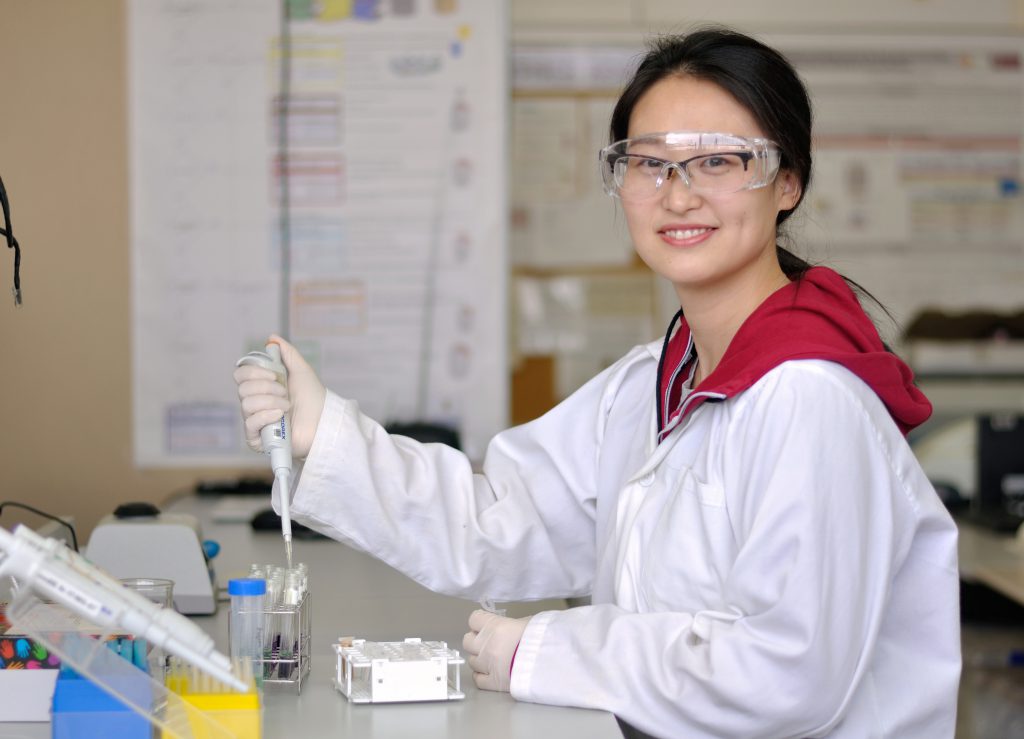11/12/2018
Junjing Wang, international student at the ETSEQ, awarded a grant by Martí i Franquès COFUND Fellowship Programme
“After my PhD I would like to keep working on sustainability and innovation”

Junjing Wang, international student at the ETSEQ, awarded a grant by Martí i Franquès COFUND Fellowship Programme
Junjing Wang (China) graduated in Food Science and Engineering at Beijing Forestry University in 2015, P.R. China, and subsequently completed her master’s degree in Food Technology and Nutrition at Lund University (Sweden) in 2017. Her master’s thesis focused on understanding the impact of protein and iso-α-acid on beer lacing by using image analysis. Her interest in scientific research has prompted her to do a PhD at the URV where she is writing the thesis “New approaches to producing emulsions and microcapsules for food applications using structured systems”, as part of the Programme in Nanoscience, Materials and Chemical Engineering, supervised by Dr Carme Güell Saperas and Dr Montserrat Ferrando.
Why did you choose the URV?
I was lucky enough to be given the chance to do a PhD at the URV. I was interested in the research topic when I saw the call for the Martí i Franquès COFUND Fellowship Programme. I did some background research into the URV, and found that it is a very competitive university in the field of chemistry in Spain. So the URV is a good opportunity and also a real challenge. At the moment, then, I am enjoying living and studying abroad. It is a thoroughly rewarding life experience.
How would you explain your research to a non-scientific audience?
As is well known, natural products such as polyphenols are sensitive to their environment. When they are exposed to air, moisture, light and temperature, they will lose their nutritional functions. My research aim is to prepare a kind of microcapsule – like a thin layer of shell – to cover the natural product, protect these natural active compounds from the atmosphere and preserve their functional properties. The microcapsules produced can be used in the cosmetic, pharmaceutical and food industries.
What are the main applications of your research? Could you give us an example?
It can be used as a supplement in functional food (e.g. antioxidant-enriched foodstuffs), in medicine (e.g. drug delivery capsules), and even in cosmetics (e.g. body lotion).
In the time you have been here, what have you liked the most about your experience at our University and in Tarragona?
As a doctoral student at the URV, I enjoy being treated more like an independent researcher. I can schedule my own experiments, interpret the results, and generate new ideas. Success certainly requires a lot of hard work, but I sincerely believe in “no pain, no gain”. Without any doubt, the support I have had from my supervisors has been essential. As a language enthusiast, I love learning new languages that I can practice in daily life. Besides its astonishing historical monuments, the beautiful Mediterranean scenery, the superb weather, the cultural festivals and the warm-hearted people, what I like most about Tarragona is that it is a small, cozy, relaxing city, where I can relax, enjoy the life and do my research.
How do you think this experience will contribute to your training and to your future?
The research experience at the URV will enable me to think scientifically, solve problems and communicate and explain my research logically to other scientists. I have enjoyed all my experiences here in both teaching and research, and I am sure they will all help me in my future career whether I become a teacher, a researcher or something else.
What are your plans once you finish your PhD?
After my PhD I would like to keep working on sustainability and innovation, and particularly on research into the valorization of agro wastes and by-products. I am looking forward to working in natural nutritional product design and development in the future.
Describe in 3 keywords…
Your research:
Valorisation; Microencapsulation; Sustainability
Tarragona:
Mediterranean; Historical; Santa Tecla
Your experience at URV:
Challenging; Fulfilling; Independent
